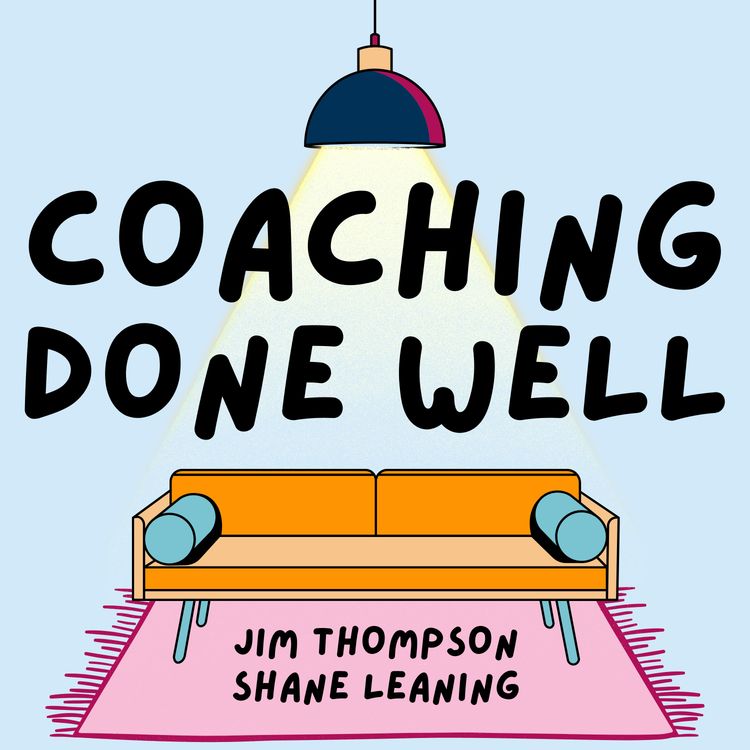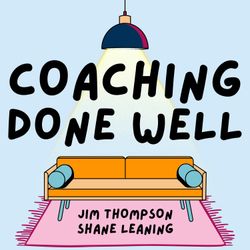Share

Coaching Done Well
Jim Knight shines a light on instructional coaching
In this conversation, Jim Knight, Jim Thompson and Shane Leaning discuss the principles of coaching done well. They emphasize the importance of being a partner in coaching, listening actively, and asking powerful questions. They also highlight the need for clear goals that are emotionally compelling and student-focused. The conversation touches on the significance of noticing and acknowledging the good in others, as well as the ongoing development and improvement of coaching skills. Overall, coaching done well involves a deep understanding of oneself, effective communication, and a focus on making a positive impact on students.
Takeaways
-Coaching done well involves being a partner, listening actively, and asking powerful questions.
-Clear goals that are emotionally compelling and student-focused are essential in coaching.
-Noticing and acknowledging the good in others is important for building trust and motivation.
-Continuous development and improvement of coaching skills are necessary for effective coaching.
- Coaching done well requires a deep understanding of oneself, effective communication, and a focus on making a positive impact on students.
More episodes
View all episodes

Coaching Done Well: Season 3 Kickoff
29:45|In this episode of Coaching Done Well, hosts Shane Leaning and Jim Thompson reflect on significant themes such as the importance of communication, connection, and professional development in education. They discuss the impact of 9/11 on their lives, share their visions for the upcoming season, and emphasize the role of teachers in student success. Practical strategies for educators are provided, including the importance of reading aloud and fostering connections with students. The episode concludes with a commitment to sustainable professional development and the power of community engagement.TakeawaysThe importance of noticing and communicating with others.Teachers play a crucial role in student success.Building connections with students is essential.Reading aloud can foster a love for learning.Professional development should be sustainable and meaningful.Creating a sense of belonging is vital in education.Coaching can significantly impact teaching practices.Engaging with the community enhances educational experiences.Listening to students' needs is crucial for their success.The power of storytelling can create lasting connections.
15. Breaking Through the Knowing-Doing Gap: Greece Central's Video Coaching Revolution
29:05||Season 2, Ep. 15In this episode of Coaching Done Well, hosts Shane Leaning and Jim Thompson engage with three educators from Greece Central School District: Elizabeth Marcello, Cedric-Michael Simmons, and Mike Zaffuts. They discuss the essence of effective coaching, the importance of video in professional development, and the ongoing efforts to enhance teaching practices through reflective coaching. The conversation highlights the significance of creating a supportive environment for teachers, the role of equity in education, and the future plans for coaching initiatives in their district. Each guest shares their personal 'why' behind their commitment to coaching and the hopes they have for the upcoming school year.TakeawaysCoaching should involve proactive participation from both coach and coachee.Effective coaching helps individuals overcome their fears and improve their skills.Video coaching serves as a bridge between professional learning and classroom practice.Training alone is insufficient; changing the environment is crucial for behavior change.Creating a safe space for reflection encourages risk-taking in teaching.Voluntary participation in coaching leads to better outcomes.Excitement about professional learning can drive growth in educators.Equity in education is essential for fostering a supportive learning environment.The use of video can help teachers reflect on their practice from their own perspective.Building a culture of collaboration and support is key to successful coaching.
14. Once you've been coached, you get it
27:05||Season 2, Ep. 14In this episode of Coaching Done Well, Shane Leaning and Jim Thompson engage with Jasmine Miller, a passionate advocate for coaching in education. Jasmine shares her journey from teaching to coaching, emphasizing the importance of creating safe spaces for reflection and growth. The conversation explores how coaching can transform educational cultures by fostering trust and psychological safety, and Jasmine provides insights from her book, 'A Teacher's Guide to Coaching,' which offers practical strategies for educators. The episode concludes with reflections on the profound impact of coaching on personal and professional development.TakeawaysCoaching done well creates a safe space for reflection.Trust is essential for effective coaching relationships.Coaching can transform educational cultures by reducing judgment.Listening to understand is key in coaching.Coaching empowers individuals to know themselves better.The experience of being coached can change perceptions of coaching.Coaching should be a choice, not an obligation.Practical strategies in coaching can enhance professional development.Coaching can help educators connect with their values and purpose.Creating a non-judgmental environment is crucial in schools.Sound Bites"Coaching done well is about creating a safe space.""Coaching is non-judgmental and empowering.""Coaching can push back on a culture of judgment.""Once you've been coached, you get it.""You get to know yourself better through coaching."
13. Steve Barkley & Bill Sommers Talk Coaching
36:28||Season 2, Ep. 13In this engaging conversation, Shane, Jim, Bill, and Steve explore the essence of effective coaching in education. They discuss the importance of reflection, vulnerability, and trust in coaching relationships, emphasizing that coaching should be a collaborative and humanizing process. The guests share their insights on how to foster a culture of learning and curiosity, and they express their hopes for the future of education, focusing on the need for increased coachability and a shift in conversations towards learning and growth.TakeawaysCoaching done well is a critical intervention for human performance.Effective coaching is rooted in conversation, reflection, and learning.Trust and vulnerability are essential for meaningful coaching relationships.Coaches should model coachability to inspire others.Reflection in action is crucial for educators to adapt and improve.Creating a safe environment encourages honest conversations.Curiosity should drive coaching conversations, not judgment.The role of hope is vital in maintaining motivation in education.Leaders should be open about their learning journeys to foster trust.Education must evolve to meet the needs of today's learners.Sound Bites"It's a conversation, not a report.""If it isn't working, do something else.""Trust is more important than the curriculum.""You can't have trust without vulnerability.""If you're not coachable, you can't coach others.""Run the experiment. See what happens.""Children need models more than critics.""I want to change the conversation and change the world."
12. Coaching is a Partnership | A Conversation with Hazel Brinkworth
24:44||Season 2, Ep. 12In this episode of Coaching Done Well, hosts Jim Thompson and Shane Leaning welcome Hazel Brinkworth, an international educator and certified coach. They discuss the essence of coaching done well, emphasizing the importance of listening, creating a safe space for conversations, and the role of nature in coaching. Hazel shares insights on self-care for leaders and the necessity of scheduling breaks to maintain effectiveness. The conversation highlights the value of thought partnerships in education and the need for educators to prioritize their well-being to better serve their students.TakeawaysCoaching done well focuses on enabling others to think critically.Listening is a crucial skill in coaching relationships.Creating a safe space is essential for effective coaching.Nature can enhance the quality of coaching conversations.Self-care is vital for leaders in education.Scheduling breaks can improve overall effectiveness.Coaching should be a partnership without a power dynamic.Trust is foundational for sharing stories in coaching.Educators need to prioritize their well-being.Less busyness can lead to greater effectiveness in leadership.
11. Listening to understand | A Conversation with Dr. Kim Richardson & Daryl Michel
32:33||Season 2, Ep. 11In this engaging conversation, Jim Thompson hosts Dr. Kim Richardson and Dr. Darrell Michel to explore the concept of 'Coaching Done Well.' They discuss the importance of creating a supportive environment for coaching, the challenges faced by coaches, and their hopes for the future of educational coaching. The dialogue emphasizes the need for emotional intelligence, the significance of belonging in educational settings, and the necessity of clear communication regarding coaching roles and responsibilities.TakeawaysCoaching done well involves creating a quiet space for coachees.Emotional intelligence is crucial for effective coaching.Coaches should help coachees find their own voice.Listening to understand is more important than problem-solving.Belonging is essential for both students and educators.Coaching should focus on student-centered outcomes.Clear communication about coaching roles is vital.Inexperienced teachers present unique challenges for coaching.Coaches should not be burdened with non-coaching duties.Modeling expectations is key to successful coaching.
10. Breaking Barriers: Women in Leadership with Claire Peet
28:09||Season 2, Ep. 10Shane, Jim, and Claire Peet explore the nuances of effective coaching in educational settings. They discuss the importance of creating authentic relationships, the need for clear coaching agreements, and the challenges women face in leadership roles. The dialogue emphasizes the significance of nurturing hope and creating spaces for vulnerability and authenticity in educational leadership.TakeawaysThe essence of coaching lies in partnership and clear agreements.Organizations should focus on discovering and celebrating internal talent.Building confidence in educational systems is crucial for self-sustainability.Breaking the glass ceiling for women requires intentional mentorship and support.Job descriptions should be gender-neutral and inviting to all candidates.Creating space for authenticity enhances educational environments.Hope is essential in leadership, especially in challenging times.Intentionality in communication fosters inclusivity in leadership roles.Mindfulness and presence are key to effective coaching and leadership.
9. The Transformative Power of Video Coaching | A Conversation with Mike Szczepanik
32:12||Season 2, Ep. 9In this episode of Coaching Done Well, Shane Leaning and Jim Thompson engage with Mike Szczepanik to explore the nuances of effective coaching in education. They discuss the importance of curiosity, the role of video coaching, and how to create a psychologically safe environment for teachers. Mike shares his personal journey in instructional coaching, emphasizing the significance of inviting teachers into the coaching process and the transformative impact of video feedback on teaching practices. The conversation highlights the collaborative nature of coaching and the need for a supportive community in education.TakeawaysCoaching done well is a journey for the coachee.Curiosity is essential for effective coaching.Creating a safe space is crucial for teacher development.Video coaching can significantly enhance teaching practices.Coaching relationships thrive on trust and collaboration.Teachers often feel judged when observed; this must change.Reflection through video helps coaches improve their techniques.Failing is a part of the learning process in coaching.The best coaching occurs in a psychologically safe environment.Coaching should empower teachers to direct their own growth.
8. New Year, New Insights | A Conversation with Rachael Lehr & Ray Boyd
45:51||Season 2, Ep. 8In this episode of Coaching Done Well, hosts Shane and Jim welcome Rachael Lehr and Ray Boyd from Dayton Primary School in Australia. They discuss the significance of coaching in education, emphasizing the need for a supportive environment that fosters a sense of belonging for both students and staff. Rachael and Ray share their unique coaching model, which focuses on recruiting for mindset rather than skillset, and the importance of having a clear vision and strategy for effective coaching. They highlight the collaborative nature of their coaching approach and the ongoing professional development that benefits both teachers and students. This conversation delves into the structured coaching process in education, emphasizing the importance of video reflection, building trust, and fostering a culture of collaboration among teachers. Rachael and Ray share their experiences in implementing a coaching framework that encourages teachers to reflect on their practices, set goals, and engage in continuous professional development. They highlight the challenges and benefits of using video as a tool for growth, the significance of authentic leadership, and the creation of a knowledge-rich community that supports teacher learning and improvement.